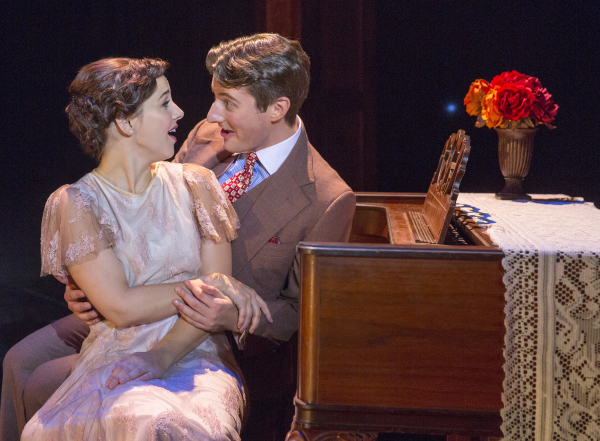The Underclassman
F. Scott Fitzgerald’s ”This Side of Paradise” inspires a new musical from Prospect Theater Company.

(© Richard Termine)
Who knew that the great American novelist F. Scott Fitzgerald began his literary career in musical theater? According to Prospect Theater Company's newest offering, The Underclassman, a musical based on Fitzgerald's debut novel This Side of Paradise, the stage was all that the strapped sophomore had on the brain. That, and Ginevra King — a debutante extraordinaire whose romantic relationship with the young writer served as inspiration for his Great Gatsby socialite, Daisy Fay Buchanan. The musical is now running at the Duke on 42nd Street.
Composer Peter Mills has built a score fit for the famous wordsmith, with clever lyrics and timely melodies that capture Fitzgerald's playful and posh surroundings as a Princeton undergrad in the early 20th century. We meet Fitzgerald in 1915, his second wasted year as an Ivy Leaguer and member of Princeton's cross-dressing musical-comedy troupe, the Triangle Club. So far his education has amounted to nothing more than a pile of blue failing notices that he cavalierly collects while waiting for some kind of life-shaking joy or sorrow to inspire the literary masterpiece he knows he has inside of him. Soon enough, at a dance following a Triangle performance, both sides of this coin come to him in the glamorous package of the aforementioned Ginevra King — a "top four debutante" of her day known to college boys far and wide as single and ready to mingle. What begins as a romantic game winds up a powerful love connection, verging on obsession for Fitzgerald.
Anyone who reads the program notes (or recognizes the name Zelda) knows going in that the pair never truly makes a go of it. The traditional tale of love gained and lost, however, is not the most intriguing part of Fitzgerald's tale. What's far more enticing is King's influence on Fitzgerald's journey to self discovery, and ultimately, to the brilliant work that she supposedly inspired. While The Underclassman is presented as an exercise in introspection on the man behind the pen, the production finds itself swallowed up by this unrequited love story, which never burns with enough passion to intrigue an audience for two and a half hours.
Silky-voiced Matt Dengler stars as Fitzgerald, and occasionally as the story's omniscient narrator — an interesting tip of the hat to the musical's source material, which nonetheless feels awkwardly shoehorned into the narrative structure. Still, as Fitzgerald, Dengler injects a youthful energy into his portrayal of the cocky, self-absorbed underclassman. King, his "muse," is introduced in an equally egocentric light by Jessica Grové, whose sweet soprano adds the necessary enthralling shine to her personal presentation.
She leads the company in the captivating song-and-dance number "To Beat the Band," which offers a window into her life as the nation's most in-demand debutante and illustrates the start of her whirlwind relationship with Fitzgerald. Throughout the production, Christine O'Grady's exciting choreography (featuring alternately classic and campy costuming by Sidney Shannon) punches up Mills' already engrossing score, which strikes a fine balance between character development and storytelling. The collaborative book by Mills and Cara Reichel (who also helms the show) unfortunately does not have nearly as gripping a hook as the score; it meanders through scenes with a seeming lack of direction, and loses its bite after the orchestra stops playing. Fitzgerald's personal story of self-awakening never fully weaves into his romance with King. Neither storyline achieves sufficient dramatic intensity, and the chemistry between Dengler and Grové becomes disappointingly stagnant throughout the upheaval that eventually comes their way.
Nevertheless, the high-energy ensemble numbers maintain the show's steady pulse, and a talented group of supporting characters buoy the central story. Billy Hepfinger and Piper Goodeve add a quirky charm as Fitzgerald and King's aptly matched, cynical comrades Bunny and Bug, while Marrick Smith poignantly portrays Fitzgerald's tortured roommate John Peale Bishop, whose poetic soul bleeds into his own. For bookworms, this is a thrilling Easter egg hunt as each character, one by one, puts a clear thumbprint on Fitzgerald's unique literary voice. If The Underclassman could find as concise a collaborative voice, Prospect Theater Company could have something very special on its hands.










